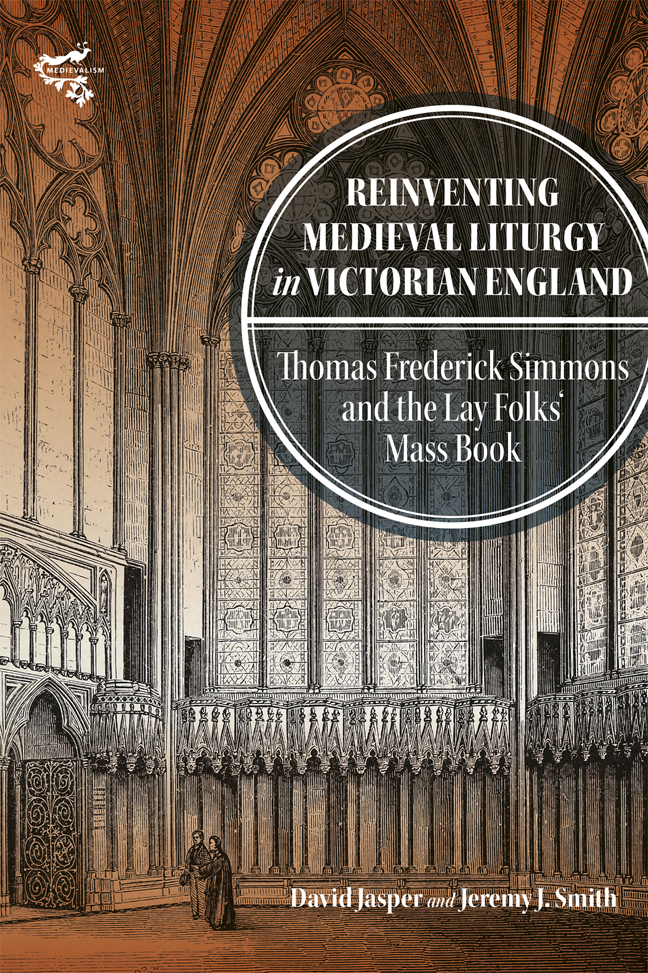 Reinventing Medieval Liturgy in Victorian England
Reinventing Medieval Liturgy in Victorian England Book contents
- Frontmatter
- Dedication
- Contents
- List of Plates
- Preface
- A note on citations
- List of abbreviations
- Introduction: Imagining the Past
- 1 Thomas Frederick Simmons and The Lay Folks’ Mass Book
- 2 Re-imagining Medieval Devotion: Nineteenth-Century Conceptions of the English Church
- 3 Simmons and the Early English Text Society
- 4 Simmons as Editor: The Philologist
- 5 Simmons as Editor: The Liturgist
- 6 Simmons as Parish Priest, and Liturgical Reform in the Victorian Church of England
- 7 The Afterlives of The Lay Folks’ Mass Book
- Conclusion: Liturgical Moments in Time
- Plates
- Appendix I The Lay Folks’ Mass Book: Text and Translation
- Appendix II The Lay Folks’ Mass Book and the Sarum Rite
- Bibliography
- Index
- Miscellaneous Endmatter
Preface
Published online by Cambridge University Press: 02 March 2024
- Frontmatter
- Dedication
- Contents
- List of Plates
- Preface
- A note on citations
- List of abbreviations
- Introduction: Imagining the Past
- 1 Thomas Frederick Simmons and The Lay Folks’ Mass Book
- 2 Re-imagining Medieval Devotion: Nineteenth-Century Conceptions of the English Church
- 3 Simmons and the Early English Text Society
- 4 Simmons as Editor: The Philologist
- 5 Simmons as Editor: The Liturgist
- 6 Simmons as Parish Priest, and Liturgical Reform in the Victorian Church of England
- 7 The Afterlives of The Lay Folks’ Mass Book
- Conclusion: Liturgical Moments in Time
- Plates
- Appendix I The Lay Folks’ Mass Book: Text and Translation
- Appendix II The Lay Folks’ Mass Book and the Sarum Rite
- Bibliography
- Index
- Miscellaneous Endmatter
Summary
This book had its beginnings some years ago when we were both teaching at the University of Glasgow. A battered volume in the liturgical library of the late Dean Ronald Jasper of York Minster entitled The Lay Folks’ Mass Book attracted our attention. It drew us towards the forgotten figure of its editor, Thomas Frederick Simmons – liturgist, churchman, second-generation Tractarian parish priest, philologist, and one of the earliest members of the Early English Text Society – and to the late medieval poem that lies at the heart of this study.
This study of the text now known as The Lay Folk’s Mass Book, and of its editing for the Early English Text Society (EETS) in 1879 by Canon Thomas Frederick Simmons, is by two authors coming from very different academic backgrounds. David Jasper is a student of the relationship between theology and literature, with a particular interest in the nineteenth century, and is thus at home in the ecclesiastical – and indeed wider cultural – world of Canon Simmons and his church. Jeremy Smith specialises in English philology, with a particular interest in late medieval and early modern textual cultures. Our project brings these two different disciplinary perspectives and their readerships into articulation, hoping to develop new insights into the Victorian encounter with the Middle Ages, with relevance to contemporary liturgical and medieval studies.
Many people have helped us towards the completion of this book over the years. We thank in particular the staff of the following: the Archives Service of the East Riding of Yorkshire in Beverley; the Bodleian Library, Oxford; the Borthwick Institute for Archives in the University of York; the British Library, London; Cambridge University Library; the Community of the Resurrection, Mirfield; the Library of Corpus Christi College, Oxford; Glasgow University Library; the Libraries of Gonville and Caius and Newnham Colleges, Cambridge; the Hull History Centre of the University of Hull; Liverpool University Library; the National Library of Scotland, Edinburgh; York Minster Library.
Warm thanks are due to the present Lord Hotham and to Giles Peacock, current Church Wardens of St Mary’s Church, South Dalton (as it is again), for their patience and generosity during our visits to their magnificent church, and our endless questions.
- Type
- Chapter
- Information
- Reinventing Medieval Liturgy in Victorian EnglandThomas Frederick Simmons and The 'Lay Folks' Mass Book', pp. xiii - xivPublisher: Boydell & BrewerPrint publication year: 2023
